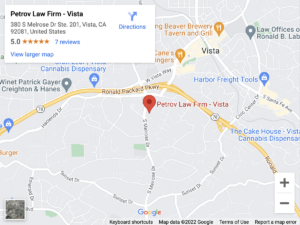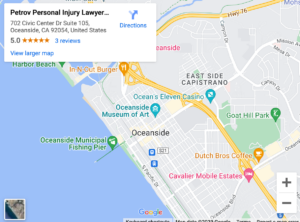
Broken bones usually happen when the forces from an accident overcome the strength of your bones. Bones can fracture quickly in a car accident. They can also fracture slowly due to repetitive motions.
Most broken bones disrupt your life for a few months before healing without complications. Some broken bones develop complications that can produce chronic problems or even kill you.
Below you will learn about the causes and effects of broken bones and the compensation you can seek for these injuries.
What is the Structure of Your Bones?

Bones provide your body with structure and strength. The rigidity of your bones holds your body up. Bones also provide leverage for your muscles to make your body stand, walk, and lift objects.
Your bones differ from your other tissues because they contain 99% of the calcium in your body. Bones have a collagen framework that gives them their shape. Calcium phosphate hardens and strengthens this framework into what scientists define as “bone.”
Although bones appear solid, the collagen structure makes them porous. Like all cells in your body, bone cells require oxygen and nutrients to live. Blood vessels run through these pores to supply your bones with the blood that delivers these essentials.
Your bones also play a vital role in your circulatory and immune systems.
The marrow inside your bones serves two functions:
- Yellow bone marrow stores fat and produces stem cells that can replace damaged bone, muscle, or cartilage.
- Red bone marrow produces new red blood cells, white blood cells, and platelets for your blood.
Ligaments secure bones in your joints. Ligaments provide structure by holding your skeleton together. They also allow your joints to move, then pull them back into place.
Tendons anchor muscles to bones. They cooperate with your muscles to move your body by contracting and relaxing.
What Are Some Causes of Broken Bones?
Broken bones can have many contributing factors. For example, your bone density decreases due to osteoporosis as you age. In osteoporosis, your bone cells do not get replaced as quickly as they break down, resulting in an overall loss of bone cells.
If you experience trauma, like a slip and fall accident, bones with less density are more likely to fracture.
Even with contributing factors like osteoporosis and other bone diseases and defects, most fractures result from two causes:
Trauma
A powerful force can break a bone into at least two pieces. Broken bones commonly result from bending forces that snap the bone into two pieces. But broken bones can also result from twisting forces or crushing blows.
Overuse
Overuse can cause small cracks to form in your bones. With rest, the body repairs these cracks. But when you repeat the same motions without adequate rest, these cracks can propagate into stress fractures.
Stress fractures can result from repetitive motions performed during exercise. They can also result from jobs where workers spend a lot of time walking, carrying, or lifting throughout the workday.
What Types of Broken Bones Can Occur?
How your bones break can affect the treatment and prognosis for your injury. Broken bones fall into two broad categories.
A non-displaced fracture happens when the broken ends of the bone remain aligned after the injury. In a non-displaced fracture, doctors usually only need to immobilize the fractured bone with a cast or brace while it heals.
A displaced fracture happens when the broken ends of the bone move out of alignment after the bone breaks. Displaced fractures often require surgery so the doctor can realign the broken ends. By realigning the broken ends and, in some cases, securing them with plates and screws, the bone can heal straight.
Doctors also categorize broken bones based on how the bones break. Some types of broken bones include:
Compound Fracture
Compound fractures happen when a fracture is displaced so far that the broken end of the bone pierces the skin. As a result, you have a bone fracture and an open wound.
To treat a compound fracture, doctors need to:
- Realign the bone
- Clean and close the wound
- Immobilize the bone with a cast or brace
Compound fractures usually involve a lot of bleeding because the broken end of the bone will tear your muscle as it displaces. Blood vessels in your broken bone will also cause bruises and bleeding.
Avulsion Fracture
Avulsion fractures happen when a piece of bone that is anchored to a ligament or tendon breaks off with the ligament or tendon attached. These fractures happen when you hyperextend a ligament or tendon and fracture the bone instead of stretching or tearing the ligament or tendon.
Doctors occasionally operate to repair an avulsion fracture. But in most cases, doctors can treat an avulsion fracture by immobilizing the fractured piece of bone and the tendon or ligament pulling on it.
Comminuted Fracture
A comminuted fracture happens when you shatter a bone. The bone breaks into at least three pieces. As a result, doctors need to reconstruct the bone with plates and screws.
If pieces are missing or too small to reassemble, doctors may use bone grafts to rebuild the bone. In some situations, doctors cannot rebuild the bone and adequately supply it with blood. When this happens, doctors may recommend amputating the limb.
What Are Some Complications from Broken Bones?
Broken bones can develop complications including:
Infection
A compound fracture can develop an infection if bacteria enter the open wound. If microorganisms get into your fractured bone, you can develop a bone infection called osteomyelitis.
Blood Clots
Broken bones heal when a blood clot forms over the fracture. The clot protects the cells as they rebuild the fractured bone.
Occasionally, a piece of the clot will break off and travel to the lungs. The clot can lodge in the lungs, causing a pulmonary embolism. This condition can kill you if you do not get emergency treatment.
How Do You Get Compensation for Broken Bones?
Compensation for a broken bone can cover your medical expenses, lost wages, and pain and suffering. You can get this compensation by proving that someone else’s negligence caused your bone fracture.
Broken bones can disrupt your life in the short term. Your cast could prevent you from working or even taking care of your daily needs for a few months. You might even develop long-term or chronic symptoms from your broken bones.
To discuss the compensation you can seek for your broken bones, reach out to Petrov Personal Injury Lawyers at (619) 344-0360 to schedule a free consultation.


